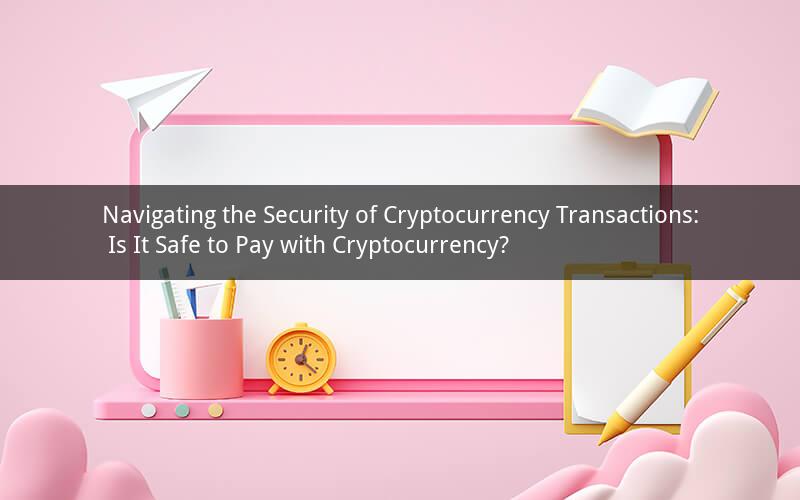
In recent years, cryptocurrency has gained significant popularity as a digital asset and a means of payment. With its increasing adoption, many individuals and businesses are curious about the safety of paying with cryptocurrency. This article delves into the security aspects of cryptocurrency transactions and provides insights into whether it is safe to pay with cryptocurrency.
1. Understanding Cryptocurrency Security
Cryptocurrency operates on a decentralized network known as a blockchain. The blockchain is a transparent and immutable ledger that records all transactions made using cryptocurrency. This inherent security feature makes it challenging for hackers to manipulate or alter the data. However, there are still potential risks associated with paying with cryptocurrency.
2. Private Keys and Wallets
To engage in cryptocurrency transactions, individuals require a digital wallet that stores their private keys. These private keys are crucial as they serve as a digital signature, authorizing transactions. If a private key is lost or stolen, the associated cryptocurrency can be easily accessed and transferred by an unauthorized party. Therefore, it is vital to keep private keys secure.
3. Phishing Attacks and Scams
One of the primary concerns when paying with cryptocurrency is the risk of falling victim to phishing attacks and scams. Cybercriminals often create fake websites or emails that mimic legitimate platforms, tricking users into revealing their private keys or personal information. To mitigate this risk, it is essential to verify the authenticity of websites and emails before providing any sensitive information.
4. Transaction Fees and Confirmation Times
When paying with cryptocurrency, transaction fees and confirmation times are important factors to consider. Cryptocurrency transactions require network fees to be processed, and the fee amount can vary depending on the network congestion. Additionally, confirmation times can be longer during peak usage periods. These factors can impact the overall security and convenience of using cryptocurrency as a payment method.
5. Regulatory Environment
The regulatory environment surrounding cryptocurrency varies across different countries and regions. Some governments have implemented strict regulations to ensure the safety of cryptocurrency transactions, while others have a more lenient approach. Understanding the regulatory landscape in your jurisdiction is crucial to assess the safety of paying with cryptocurrency.
6. Safeguarding Your Cryptocurrency
To enhance the security of your cryptocurrency transactions, consider the following measures:
a. Use reputable cryptocurrency wallets: Opt for wallets that offer robust security features, such as two-factor authentication and encryption.
b. Backup your private keys: Store your private keys in a secure location, such as a hardware wallet or a secure offline storage device.
c. Be cautious with third-party services: Exercise caution when using third-party services, as they may have their own security vulnerabilities.
d. Keep your software updated: Regularly update your operating system and antivirus software to protect against malware and viruses.
e. Educate yourself: Stay informed about the latest security threats and best practices in cryptocurrency transactions.
7. Conclusion
Is it safe to pay with cryptocurrency? The answer depends on various factors, including the security measures you implement and the regulatory environment in your jurisdiction. By understanding the risks and taking appropriate precautions, you can enhance the safety of your cryptocurrency transactions. Remember to keep your private keys secure, stay vigilant against phishing attacks, and stay informed about the regulatory landscape to ensure a secure and reliable cryptocurrency payment experience.
Questions and Answers:
1. Q: Can I use cryptocurrency to make purchases online?
A: Yes, you can use cryptocurrency to make purchases online by linking your digital wallet to the desired platform or using a cryptocurrency payment processor.
2. Q: Are there any risks associated with using cryptocurrency ATMs?
A: Yes, there are risks associated with using cryptocurrency ATMs, such as the possibility of physical theft, technical malfunctions, and the risk of dealing with untrusted operators.
3. Q: Can my cryptocurrency be frozen if I pay with it?
A: In some cases, your cryptocurrency can be frozen if there are legal investigations or disputes involving the transaction. However, this is relatively rare.
4. Q: Is it necessary to have a cryptocurrency exchange account to pay with cryptocurrency?
A: No, you do not necessarily need a cryptocurrency exchange account to pay with cryptocurrency. You can simply use your digital wallet to initiate transactions.
5. Q: Can I use cryptocurrency to pay for international transactions?
A: Yes, cryptocurrency can be used for international transactions, offering a decentralized and borderless payment method. However, it is essential to consider the volatility of cryptocurrency prices and transaction fees.